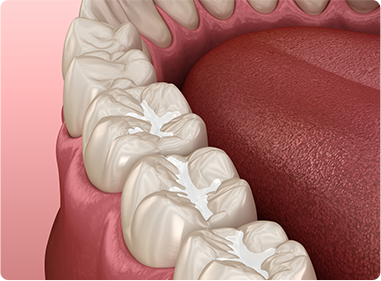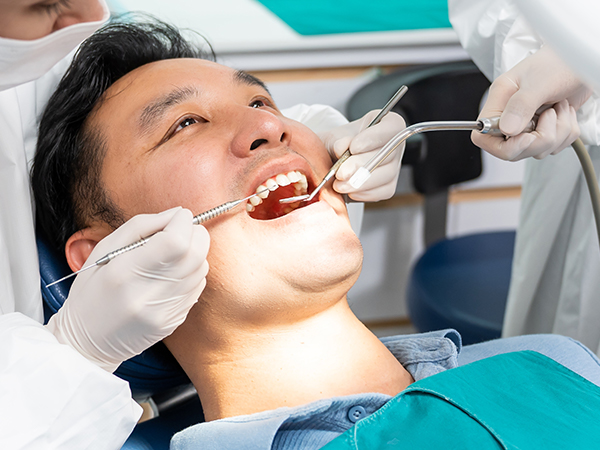General Dentistry Services Offered at ELITE CARE DENTAL
At ELITE CARE DENTAL we offer a wide array of services including preventive care, cosmetic dentistry and restorative treatments. Our goal is to ensure that you receive the highest quality care tailored to meet your unique dental needs and achieve optimal oral health.
Diagnosis

A comprehensive exam is the starting point of your journey with ELITE CARE DENTAL. A lot of measures, including a Panoramic radiograph, Full mouth X-ray, and clinical photos or intraoral digital scan, are taken in order to help Dr. Park identify issues with the teeth or gums and set areas to focus on. Then a visual exam allows Dr. Park to confirm problems that were seen in the radiograph. Through this process, Dr. Park can make the right diagnosis and eventually set up an ideal treatment plan for the patient. A comprehensive exam is required by all insurance companies, even if you only plan to receive a teeth cleaning.
Limited Exam
A limited exam is done when you want to focus on a certain area. Oftentimes, when you have discomfort in a certain tooth or gum area, a few Bitewing radiographs and Periapical radiographs can be taken instead of a Full mouth radiograph, and Dr. Park can diagnose and set up a localized treatment plan for the problem. Teeth cleanings cannot be planned through a limited exam. However, a comprehensive exam can be done later after the local issue is resolved.
Emergency Visits
Dental emergency usually relates to broken teeth or swelling and pain around the teeth. Emergency surgical extraction surgeries or Root canal treatments with antibiotic prescriptions can be done within Emergency visits. Contact us to see if an emergency visit could be booked.Office Visits for 2nd Opinions
Every dentist’s diagnosis can be a little different, and sometimes it doesn’t hurt to have a 2nd opinion from a reliable dentist like Dr. Park. Although it is challenging to judge or patch another dentist’s work, Dr. Park is willing to give an objective second opinion in case the patient is not sure about a diagnosis or dental work.Periodontal
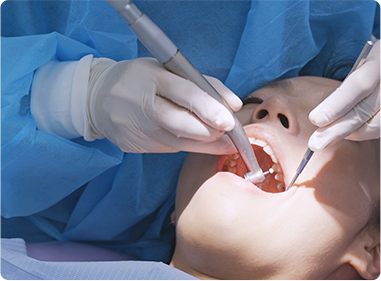
Deep Cleaning
A deep cleaning is often planned when active gum disease is diagnosed, based on the clinical buildup of calculus and bone loss is observed in the radiograph. Under anesthesia, ultrasonic scaler and hand instruments are used to get deep inside the gum and scrape out all the calculus buildup and inflamed tissue. Only after the surface of the teeth is clean does the healing process of the gum start. Bleeding or soreness after the deep cleaning usually goes away within a few days and three or four months follow-up maintenance cleanings are scheduled. It is tempting for the patient to just get away with a regular cleaning. However, if there is active gum disease, deep cleaning is highly recommended.
Regular Cleaning
For patients who have minimal gum inflammation without alveolar bone loss, a regular cleaning can be done without anesthesia. It is strongly recommended to follow up with regular cleanings every 6 months and not skip more than a year. Patients who skipped their regular cleaning for more than a year often end up needing a deep cleaning due to active gum disease.
"Arestin" Application
A prescription antibiotic is applied when there is active gum disease and a certain spot has relatively deep, infected gum pockets. It has great clinical results in fighting harmful bacteria that deep cleaning alone might leave behind.Laser Dentistry
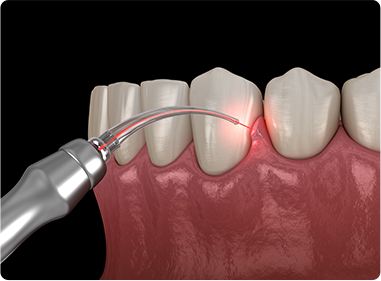
Laser Dentistry
Various uses of lasers also include teeth cleaning. Laser offers a minimally invasive method to remove plaque, calculus buildup in areas difficult to reach. It ensures reduced discomfort and faster healing. ELITE CARE DENTAL provides safe laser dental service for a variety of procedures.Prosthodontics
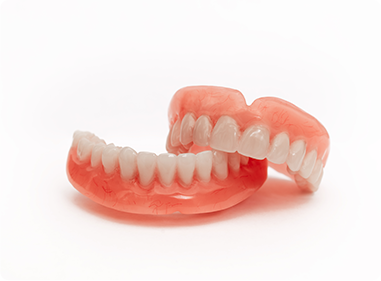
Complete (Full) Dentures
For patients without teeth, a complete denture can be a great option. There are two ways to fabricate full dentures. First, the traditional way of full denture fabrication includes taking an impression, checking the bite, and setting teeth with a wax denture and delivering the processed final denture. An alternative way is to digitally scan and fabricate a denture out of the scan. It requires fewer visits but doesn’t fit as well as traditional dentures.Immediate Dentures
For patients who have no option but to pull out all of their remaining teeth and become edentulous, an immediate denture can become a savior. Immediate dentures are prefabricated out of impressions that are taken upfront. The prepared denture can be delivered the same day after teeth extraction. Although it doesn’t fit perfectly, the patient can at least leave with a denture that has teeth, and chairside relining of the immediate denture can also help improve the fit of the denture.
Removable Partial Dentures
A Removable Partial Denture (RPD) can be a great option for patients who have partial edentulism with multiple spaces between their teeth. Multiple spaces can be restored with denture teeth connected to a partial denture. There are two types of partial dentures. A traditional metal-cast RPD provides stability thanks to the metal framework. A Valplast flexible RPD is lightweight and more esthetic. Dr. Park will be able to make recommendations based on the patient’s clinical situation.Overdentures
An overdenture can be considered in case only a few front teeth remain. Remaining teeth can be domed, and the overdenture sits on top of those domed teeth for retention. ‘Snap-On’ dentures are often misperceived as Overdentures. However, it’s a different concept because ‘Snap-On’ dentures are implant-supported Overdentures, which means at least two implants will be placed first as the anchor for the Overdenture.Denture Relining
For old, ill-fitting dentures, a relining can be recommended. Chairside soft relining can be fast and convenient. However, they are designed for temporary use. Hard relining, which means sending the denture to the lab, often ensures a better clinical outcome.Night Guards
Patients who have neuromuscular parafunctional habits, including grinding, clenching, can suffer from bite change caused by generalized attrition of teeth. Night guards can prevent or stop these symptoms and protect the teeth from further attrition. It only takes two appointments to get a night guard.Restorative
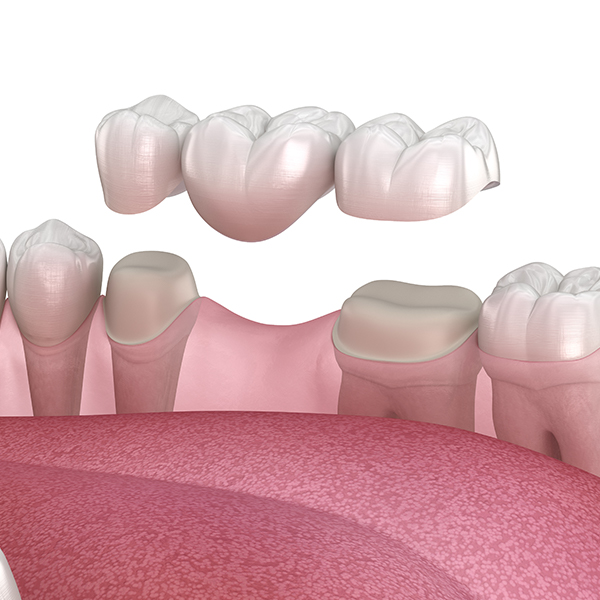
Composite Fillings
When decay (caries) is detected—either through clinical examination or X-rays—a composite filling is often the best treatment to preserve and protect your tooth. We remove the infected area and restore your tooth using tooth-colored, research-backed composite materials that offer strength, longevity, and natural aesthetics.Not all fillings are created equal.
- Simple fillings (e.g., on the chewing surface or outer enamel) are typically quicker to restore
- Complex fillings, such as those between teeth or covering multiple surfaces, are more technique-sensitive and require greater precision.
That’s why we never rush the process or use budget materials. We’re committed to doing it right—not just fast—and delivering results that last.
Dental Crowns
A crown acts like a protective "cap" for a tooth that’s been structurally compromised—whether due to deep decay, cracks, or breakage.
Here’s what to expect:
- The tooth is shaped to allow space for the crown material.
- We take an impression or digital scan to ensure a custom fit.
- A temporary crown is placed while the final crown is fabricated in the lab.
Depending on the severity and depth of decay, a root canal treatment may be required before placing a crown—especially if the cavity is close to the nerve. However, many teeth can be crowned without root canals, which requires careful preparation to maintain safety and comfort.
At ELITE CARE DENTAL, we:
- Use only premium ceramic and zirconia materials (never cheap alloys)
- Focus on precise margins to avoid bacteria traps that cause recurrent decay
- Customize every crown for ideal strength, fit, and natural esthetics
Poorly made crowns can cause more problems than they solve. Our priority is to deliver crowns that look beautiful and function flawlessly—so you can chew, smile, and live with confidence.
Dental Bridges
Think of a dental bridge like a London Bridge—anchored by healthy teeth on both sides with a replacement tooth in the middle. A bridge is a non-removable solution for one or more missing teeth, using the neighboring teeth as support.
What’s involved:
- The teeth adjacent to the gap are prepared for crowns
- A custom bridge is fabricated, with the “fake tooth” (pontic) suspended between two crowns
- The entire bridge is cemented into place for a secure, functional restoration
Dental bridges are ideal when:
- The surrounding teeth are healthy enough to support a restoration
- There is a “terminal tooth” behind the missing space (a bridge cannot “float”)
Bridgework is highly technique-sensitive—requiring careful angulation and parallelism of the prepared teeth for proper fit and function.
At ELITE CARE DENTAL, we take the time to ensure the bridge is stable, aesthetic, and built to last. Most dental insurance plans offer partial coverage for bridges, making them an accessible solution for many patients.
Preventive
